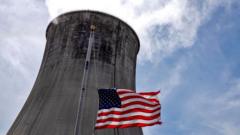China's Ministry of Commerce declared a 15% tariff on coal and liquefied natural gas, aiming to counter the US's unilateral trade measures. Other US products facing a 10% tariff include crude oil, agricultural machinery, and various vehicles. The measures reflect China's deepening frustrations with the United States, particularly concerning accusations of breaking international trade rules.
Concurrently, tensions have intensified with China's complaints lodged at the World Trade Organization (WTO). The Chinese government insists that these US tariffs not only fail to resolve American issues but also strain economic cooperation between the two nations. In retaliation, China has also blacklisted additional US companies, purportedly for discriminatory actions against Chinese enterprises, and plans to restrict exports of vital minerals critical for electronics and renewable energy technologies.
This escalating trade war is part of a long trajectory of both nations imposing reciprocal tariffs on an array of goods worth billions of dollars. The outcome remains uncertain as the potential effects on business investment and market strategies loom large amid fears of long-term economic instability.
Recent agreements with Canada and Mexico suggest that Trump's administration is attempting to stabilize certain trade relations, but the fate of the American economy remains precarious as the standoff with China continues. The implications of these tariffs are expected to reverberate globally, especially as industries grapple with the shifting landscape and associated costs.
Concurrently, tensions have intensified with China's complaints lodged at the World Trade Organization (WTO). The Chinese government insists that these US tariffs not only fail to resolve American issues but also strain economic cooperation between the two nations. In retaliation, China has also blacklisted additional US companies, purportedly for discriminatory actions against Chinese enterprises, and plans to restrict exports of vital minerals critical for electronics and renewable energy technologies.
This escalating trade war is part of a long trajectory of both nations imposing reciprocal tariffs on an array of goods worth billions of dollars. The outcome remains uncertain as the potential effects on business investment and market strategies loom large amid fears of long-term economic instability.
Recent agreements with Canada and Mexico suggest that Trump's administration is attempting to stabilize certain trade relations, but the fate of the American economy remains precarious as the standoff with China continues. The implications of these tariffs are expected to reverberate globally, especially as industries grapple with the shifting landscape and associated costs.





















